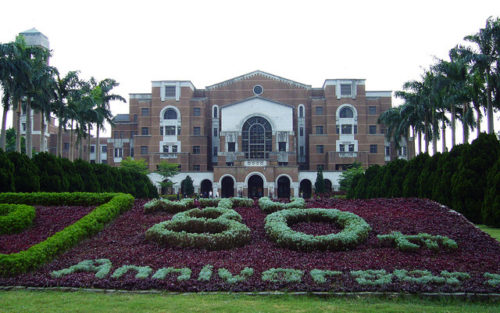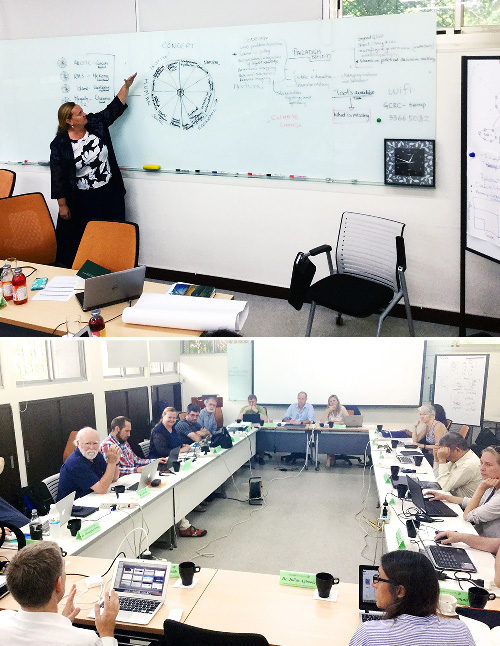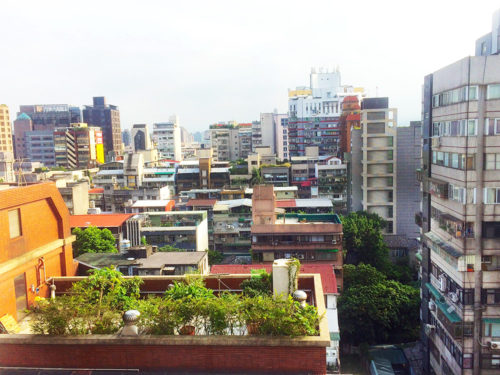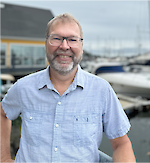Future Earth's Coasts
Heath Kelsey ·I had the great opportunity to represent IAN and UMCES as the institutional representative to the Future Earth's Coasts Scientific Steering Committee meeting in Taipei, Taiwan last week. Hosted by JC Lin at the National Taiwan University, the meeting brought together 15 representatives from all over the world to discuss the scientific direction of the group for the next five years. Future Earth's Coasts is a project that takes over from a group called Land Ocean Interactions in the Coastal Zone, and sits in another project called Future Earth. Future Earth projects seek sustainable development globally through a variety of project areas.

The meeting objective was primarily to begin designing the science implementation plan for Future Earth's Coasts, which drew heavily on the idea of stakeholder engagement in the scientific process. IAN has helped our partners achieve this strong engagement through a participatory report card process in many areas, including India, the Mississippi River, and the Orinoco River in Colombia, South America. In thinking through the Science Implementation plan, we outlined two papers to establish the foundation. One will highlight the global crisis in the sustainability of coastal societies, recognizing that in most areas we are vastly exceeding the capacity of coastal ecosystems to support our activities. The second will identify pathways to coastal sustainability through fundamental changes in the way science is undertaken and incorporated into decision-making. This will more closely reflect the design of the Science Implementation Plan.
Currently more than 50% of the world’s population lives within 100km of the coast, mostly in rapidly growing urban centers. But our coasts are also assaulted by rising seas, more frequent storms and flooding, overuse of marine resources, and intensifying upstream land use. Decisions made about all of these issues are most often made singly, without consideration of other sectors or cumulative consequences. We desperately need a fundamental change in the way we make decisions about our coastal resources; fully and effectively integrating science into the decision-making process is key to achieving sustainability.

The four days of meetings were inspiring for me personally - participants were thinking big and thinking passionately not only about the problems, but also about solutions. Some really great ideas came out of our discussions, centering on the theme of inclusion of science into decision-making, which is rewarding, because this is a goal that IAN has been focused on since it began in 2002. The inspiration also came from the sense of urgency - the problem is critical, and the solutions will require rapid and dramatic change to the current way we do things. There are lots of synergies in the group, and I'm certain that IAN will be working closely with several of these new colleagues in the future.

The meeting was also very well-organized. Project leadership did a good job of keeping us all focused and productive, and our host was amazingly generous with time, facilities, and effort to make sure everything ran smoothly. In addition to the wonderful and plentiful food, we had a day long field trip along the coast to get a first hand look at the issues that Taiwan faces in coastal sustainability, and show off the beauty of the northern coast, just outside of Taipei. Taipei is a modern, clean, and friendly city, with no shortage of things to see and do (although our time off was very limited.)

I am left with a great feeling about what we accomplished (even though we travelled so far and expanded our carbon footprints to do it!). I was also left with a wonderful impression of Taiwan's friendly people and beautiful landscapes. I look forward to working more with our new colleagues in completing the important work we began, and to returning someday, to Taiwan.
About the author
Heath Kelsey

Heath Kelsey has been with IAN since 2009, as a Science Integrator, Program Manager, and as Director since 2019. His work focuses on helping communities become more engaged in socio-environmental decision making. He has over 10-years of experience in stakeholder engagement, environmental and public health assessment, indicator development, and science communication. He has led numerous ecosystem health and socio-environmental health report card projects globally, in Australia, India, the South Pacific, Africa, and throughout the US. Dr. Kelsey received his MSPH (2000) and PhD (2006) from The University of South Carolina Arnold School of Public Health. He is a graduate of St Mary’s College of Maryland (1988). He was also a Peace Corps Volunteer in Papua New Guinea from 1995-1998.

